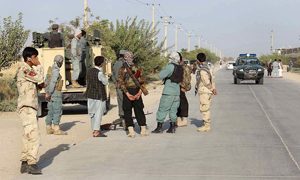Kunduz, Oct 3: The Taliban launched an assault on Kunduz, which was the scene of intense fighting today, one year after the Islamist militia briefly took over the northern Afghan city following a lightning offensive.
 The assault came just a day before President Ashraf Ghani is due to meet world powers at a major donors conference in Brussels.
The assault came just a day before President Ashraf Ghani is due to meet world powers at a major donors conference in Brussels.
The attack began in the early hours at the southern and eastern approaches to the provincial capital where the militants were engaged in battles with government forces, an AFP correspondent said.
Two Afghan army helicopters were flying over the city, which was deserted, with streets empty and shops closed.
The attack comes just over a year after the Taliban overran Kunduz, the only provincial capital to have fallen into their hands since they were ousted from power in 2001. Government control of the city has been shaky ever since.
Ghani will meet with world leaders in Brussels on Tuesday and Wednesday in a bid to secure financial aid from the international community up to 2020 to rebuild his war-ravaged country.
The meeting will try to drum up support from an international community suffering from aid fatigue as it grapples with conflicts in Syria and Iraq plus the worst migration crisis since World War II.
US Secretary of State John Kerry and UN Secretary General Ban Ki-moon are among those who will join hosts Ghani and EU President Donald Tusk.
The conference comes as Afghanistan struggles to negotiate peace with a resurgent Taliban and other militant groups who continue to wage a bloody insurgency nearly 15 years after the US invasion.
In September, Kabul signed a peace deal with notorious warlord Gulbuddin Hekmatyar, who heads the largely dormant Hezb-i-Islami militant group, a move that will have little impact on security but is a symbolic victory in efforts to bring the Taliban to the negotiating table.
Financial support is "crucial" in order "to bring about a new strategic shift towards stabilisation and possibly peace" in Afghanistan, despite the country not having "been in the headlines for many years", officials said ahead of the Brussels conference.
"Nobody can afford for Afghanistan to destabilise again," a senior EU official added.After seizing Kunduz on September 28, 2015, the Taliban held the city for two days and eventually announced they were withdrawing from the outskirts on October 15.
The United Nations said that battle left 289 people dead and hundreds more wounded.






Comments
Add new comment